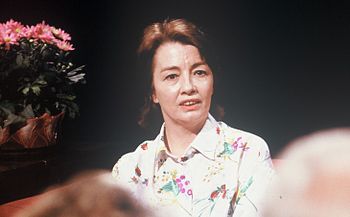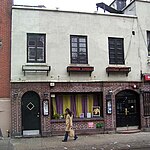The 1960s Portal
The 1960s became synonymous with the new, radical, and subversive events and trends of the period. In Africa the 1960s was a period of radical political change as 32 countries gained independence from their European colonial rulers. Some commentators have seen in this era a classical Jungian nightmare cycle, where a rigid culture, unable to contain the demands for greater individual freedom, broke free of the social constraints of the previous age through extreme deviation from the norm. Christopher Booker charts the rise, success, fall/nightmare and explosion in the London scene of the 1960s. However, this alone does not explain the mass nature of the phenomenon. Several nations such as the U.S., France, Germany and Britain turned to the left in the early and mid 1960s. In the United States, John F. Kennedy, a Keynesian and staunch anti-communist, pushed for social reforms. His assassination in 1963 was a stunning shock. Liberal reforms were finally passed under Lyndon B. Johnson including civil rights for African Americans and healthcare for the elderly and the poor. Despite his large-scale Great Society programs, Johnson was increasingly reviled by the New Left at home and abroad. The heavy-handed American role in the Vietnam War outraged student protestors across the globe, as they found peasant rebellion typified by Ho Chi Minh and Che Guevara more appealing. Italy formed its first left-of-center government in March 1962 with a coalition of Christian Democrats, Social Democrats, and moderate Republicans. Socialists joined the ruling block in December 1963. In Britain, the Labour Party gained power in 1964. In Brazil, João Goulart became president after Jânio Quadros resigned. This is a Featured article, which represents some of the best content on English Wikipedia..
The 1962 Tour de France was the 49th edition of the Tour de France, one of cycling's Grand Tours. The 4,274-kilometre (2,656 mi) race consisted of 22 stages, including two split stages, starting in Nancy on 24 June and finishing at the Parc des Princes in Paris on 15 July. There were four time trial stages and no rest days. After more than 30 years, the Tour was again contested by trade teams instead of national teams. Jacques Anquetil of the Saint-Raphaël–Helyett–Hutchinson team won the overall general classification, defending his title to win his third Tour de France. Jef Planckaert (Flandria–Faema–Clément) placed second, 4 min 59 s in arrears, and Raymond Poulidor (Mercier–BP–Hutchinson) was third, over ten minutes behind Anquetil. Anquetil's teammate Rudi Altig took the first general classification leader's yellow jersey after winning the first stage. He lost it the following day to André Darrigade of Gitane–Leroux–Dunlop–R. Geminiani, who won stage 2a, before regaining it after winning stage three. The lead was taken by Saint-Raphaël rider Albertus Geldermans after stage six. He held it for two stages, before Darrigade took it back for the next two. Flandria rider Willy Schroeders then led the race between the end of stage nine to the end of eleven, at which point Schroeders' teammate Rik Van Looy, a major pre-race favourite, abandoned the race with an injury. The following day, British rider Tom Simpson (Gitane–Leroux) became the first rider from outside mainland Europe in history to wear the yellow jersey. He lost it to Planckaert after stage thirteen's individual time trial to Superbagnères in the Pyrenees. He held the lead for seven stages, which included the Alps. Anquetil's victory in the individual time trial of stage twenty put him in the yellow jersey, which he held until the conclusion of the race. (Full article...)This is a Good article, an article that meets a core set of high editorial standards.
The 1966 Syrian coup d'état refers to events between 21 and 23 February during which the government of the Syrian Arab Republic was overthrown and replaced. The ruling National Command of the Arab Socialist Ba'ath Party were removed from power by a union of the party's Military Committee and the Regional Command, under the leadership of Salah Jadid. The coup was precipitated by a heightening in the power struggle between the party's old guard, represented by Michel Aflaq, Salah al-Din al-Bitar, and Munif al-Razzaz, and the radical leftist factions adhering to a Neo-Ba'athist position. On 21 February, supporters of the old guard in the army ordered the transfer of their rivals. Two days later, the Military Committee, backing the radical leftist factions, launched a coup that involved violent fighting in Aleppo, Damascus, Deir ez-Zor, and Latakia. As a result of the coup, the party's historical founders fled the country and spent the rest of their lives in exile. (Full article...)Selected picture - Christine Keeler, best known for her involvement in the Profumo Affair, which lead to the resignation of British Prime Minister Harold Macmillan.
Did you know -
Related portalsThis is a Featured article, which represents some of the best content on English Wikipedia..
George Harrison MBE (25 February 1943 – 29 November 2001) was an English musician, singer and songwriter who achieved international fame as the lead guitarist of the Beatles. Sometimes called "the quiet Beatle", Harrison embraced Indian culture and helped broaden the scope of popular music through his incorporation of Indian instrumentation and Hindu-aligned spirituality in the Beatles' work. Although the majority of the band's songs were written by John Lennon and Paul McCartney, most Beatles albums from 1965 onwards contained at least two Harrison compositions. His songs for the group include "Taxman", "Within You Without You", "While My Guitar Gently Weeps", "Here Comes the Sun" and "Something". Harrison's earliest musical influences included George Formby and Django Reinhardt; subsequent influences were Carl Perkins, Chet Atkins and Chuck Berry. By 1965, he had begun to lead the Beatles into folk rock through his interest in Bob Dylan and the Byrds, and towards Indian classical music through his use of Indian instruments, such as the sitar, which he had become acquainted with on the set of the film Help! He played sitar on numerous Beatles songs, starting with "Norwegian Wood (This Bird Has Flown)". Having initiated the band's embrace of Transcendental Meditation in 1967, he subsequently developed an association with the Hare Krishna movement. (Full article...)This is a Good article, an article that meets a core set of high editorial standards.
Félix Houphouët-Boigny (French: [feliks ufwɛ(t) bwaɲi]; 18 October 1905 – 7 December 1993), affectionately called Papa Houphouët or Le Vieux ("The Old One"), was an Ivorian politician and physician who served as the first president of Ivory Coast from 1960 until his death in 1993. A tribal chief, he worked as a medical aide, union leader, and planter before being elected to the French Parliament. He served in several ministerial positions within the French government before leading Ivory Coast following independence in 1960. Throughout his life, he played a significant role in politics and the decolonisation of Africa. Under Houphouët-Boigny's politically moderate leadership, Ivory Coast prospered economically. This success, uncommon in poverty-ridden West Africa, became known as the "Ivorian miracle"; it was due to a combination of sound planning, the maintenance of strong ties with the West (particularly France) and development of the country's significant coffee and cocoa industries. However, reliance on the agricultural sector caused difficulties in 1980, after a sharp drop in the prices of coffee and cocoa. (Full article...)
Selected article -The Graduate is a 1967 American independent romantic comedy-drama film directed by Mike Nichols and written by Buck Henry and Calder Willingham, based on the 1963 novel of the same name by Charles Webb, who wrote it shortly after graduating from Williams College. The film tells the story of 21-year-old Benjamin Braddock, a recent college graduate with no well-defined aim in life who is seduced by an older married woman, Mrs. Robinson, but then falls for her daughter, Elaine. The Graduate was released December 21, 1967, to critical and commercial success, grossing $104.9 million in the United States and Canada, making it the highest-grossing film of 1967. Adjusted for inflation (as of 2021), the film's gross is $857 million, making it the 22nd highest-grossing film in the United States and Canada, with inflation taken into account. (Full article...)More Did you know (auto generated)
TopicsCategoriesWikiProjects
Associated WikimediaThe following Wikimedia Foundation sister projects provide more on this subject:
Discover Wikipedia using portals |






























